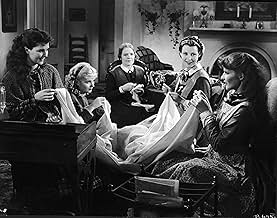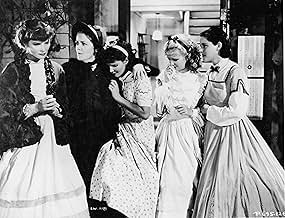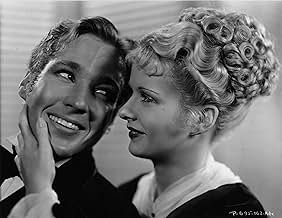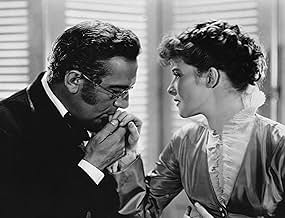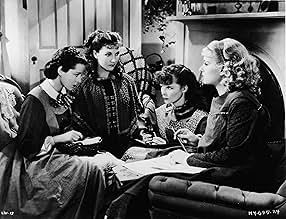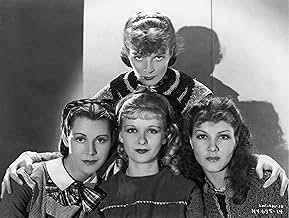VALUTAZIONE IMDb
7,1/10
8346
LA TUA VALUTAZIONE
Una cronaca della vita di sorelle che crescono nell'America del novecento.Una cronaca della vita di sorelle che crescono nell'America del novecento.Una cronaca della vita di sorelle che crescono nell'America del novecento.
- Regia
- Sceneggiatura
- Star
- Vincitore di 1 Oscar
- 7 vittorie e 4 candidature totali
John Lodge
- Brooke
- (as John Davis Lodge)
Samuel S. Hinds
- Mr. March
- (as Samuel Hinds)
Nina Borget
- Housekeeper
- (non citato nei titoli originali)
Francesca Braggiotti
- Dance Teacher
- (non citato nei titoli originali)
Luke Cosgrave
- Old Man
- (non citato nei titoli originali)
Recensioni in evidenza
I will always have a soft spot for this film, and to me it is the best version of the three versions I've seen so far of Little Women(1994 and 1949 were the others, and I liked both of them very much). The sound here is a little too tinny, and the Laurie of Douglass Montgommery is too fey for my tastes. However, it still looks beautiful, the costumes and hairstyles are well suited to the period, the sets are sumptuous and the film is very handsomely shot. There is also a stirring score from Max Steiner, making it sound appropriately nostalgic, the script is faithful and warm-toned, it is directed with great taste by George Cukor and the story has all the warmth and poignancy of the book, which is one of my favourites of all time. Apart from Montgommery I loved the acting, Edna May Oliver here does what she did best, more than convincingly play sharp-tongued spinsters, and Henry Stephenson is a dear Mr Laurence. Paul Lukas is an unexceptional but romantic Professor Bhaer, an improvement on the wooden and too-Italianate Rosanno Brazzi in the 1949 film, and Spring Byington a Marmee of real sincerity. The four March girls Meg, Jo, Beth and Amy(aka the Little Women of the title) are what drive the story, and all four really shone here. Joan Bennett is appealing as Amy and leaves room for character growth from a vain little girl to an elegant young lady. Jean Parker is a very sweet and moving Beth, and Frances Dee is beautiful as Meg should be. Best of all is the Jo of Katharine Hepburn, who is perfectly cast in a role she was born to play. All in all, truly lovely and the best version to me. 9/10 Bethany Cox
The film might be more accurately titled "Little Woman", with Katherine Hepburn seizing the lead role, and never letting go. Otherwise, it's the story of four "Little Women" growing up, and finding love's direction. Hepburn (she's Jo) is sister to Joan Bennett (she's Amy), Jean Parker (she's Beth), and Frances Dee (she's Meg). Of their suitors, Douglass Montgomery (he's Laurie) gets the most action.
Ms. Bennett steals the actual acting honors with a performance that is natural and consistent; her voice and mannerisms are appropriately girlish, young womanish and, selfish. Ms. Hepburn plays girlish like she's had too many cups of coffee; additionally, she never looks even remotely "tomboyish"; looking, instead, like a ravishingly made-up MGM movie star. Ms. Parker rises out of her sick bed like a zombie, but is okay in other scenes.
Watching Hepburn being romanced by Mr. Montgomery and Paul Lukas is unnerving. The story does have some reasons to watch, however. The production is obviously top-of-the-line. Hepburn may not be in her best role, but it's not awful; she slows down and gets better after her character grows older. The script has well-written characters - Jo, Amy, and Laurie - who illustrate a sweet story of family, love, and friendship.
******* Little Women (11/16/33) George Cukor ~ Katharine Hepburn, Joan Bennett, Douglass Montgomery, Paul Lukas
Ms. Bennett steals the actual acting honors with a performance that is natural and consistent; her voice and mannerisms are appropriately girlish, young womanish and, selfish. Ms. Hepburn plays girlish like she's had too many cups of coffee; additionally, she never looks even remotely "tomboyish"; looking, instead, like a ravishingly made-up MGM movie star. Ms. Parker rises out of her sick bed like a zombie, but is okay in other scenes.
Watching Hepburn being romanced by Mr. Montgomery and Paul Lukas is unnerving. The story does have some reasons to watch, however. The production is obviously top-of-the-line. Hepburn may not be in her best role, but it's not awful; she slows down and gets better after her character grows older. The script has well-written characters - Jo, Amy, and Laurie - who illustrate a sweet story of family, love, and friendship.
******* Little Women (11/16/33) George Cukor ~ Katharine Hepburn, Joan Bennett, Douglass Montgomery, Paul Lukas
It's always a wonderful feeling when a film works its wonders on you. LITTLE WOMEN had that effect on me, and I'm not even a fan of these types of stories. This adaptation of the Louisa May Alcott classic has real heart, warmth, and the right amount of sentimentality, amounting to a wonderful film. Katharine Hepburn stars as the tomboyish Jo, a free-spirited young lady who is dying for adventure but craves the time she spends with her sisters. The one that stands out among the four is Beth, a caring, sweet girl with a flair for the piano. If you don't get teary-eyed about her cause, you definitely pass for a curmudgeon. The only complaint I have about this gem is that the last quarter of the film doesn't seem to have the matching effervescence that the rest of the film had. It ends abruptly and off-balance. All qualms aside, this is a genuine classic, filled with great performances and characters you can't help but like. A true family entertainment. Rating: Three stars and a half.
LITTLE WOMEN is quite possibly the one book written post-Shakespeare that has the most number of film adaptations to its credit. Louisa May Alcott's novel, after all, offers a fine host of roles, particularly for women--of the March girls alone, there's the eldest sister Meg; the frail but saintly Beth; spoilt baby of the family Amy; and last but most certainly not least, spunky tomboy Jo. (This is not to forget the smaller, but still integral, supporting roles of Laurie, Mr Lawrence, Professor Bhaer, and of course, Marmee March.) The story is an engaging one too, following the lives of the March sisters--in particular Jo--as they grow and deal with change, with love, and even with death. Even though the story itself is tied to a particular setting in the 1860s (and even then the historical setting is almost peripheral), the characters and their relationships with one another--siblings, parent/children, friends and lovers--are simply timeless. That's probably why the novel has seen as many attempts to have it committed to film as it has.
I hate to make a snap judgement, having not seen any more versions of Little Women than the 1994 one, but I believe that this version, made by RKO studios and starring a delightful Katharine Hepburn as Jo March, has every right to be considered the definitive film version of the Alcott novel. The writing, for one thing, is exceptional. Although never quite the novel's substitute, it condenses the book marvellously, sketching the characters and relationships of the girls quickly and efficiently, and never skipping over the best parts of the book (for example, Laurie's profession of love for Jo). Of course the screenplay will never measure up to the book--it is rare that a film could surpass the wealth of detail and beauty of description available from the written word. But nothing's perfect, and this screenplay, by Sarah Y. Mason and Victor Heerman, is as close as an adaptation can get while retaining its own distinct flavour as a film.
As for the casting, I have very few complaints about it, since Hepburn--all angles and attitude, all loud-voiced and tomboyish--is perfect as Jo and is ably supported by Frances Dee as Meg, Henry Stephenson as the sweetly paternal Mr. Laurence and Douglass Montgomery as Laurie (though he plays the role a tad too fey for my liking). Special praise must be reserved for both Jean Parker (Beth March) and Paul Lukas (Professor Fritz Bhaer): Parker for bringing an impossibly sweet and lovely character to life, and making the audience genuinely grieve for Beth when she takes her leave of her family; Lukas for managing to avoid making Professor Bhaer a hard, frightening man with whom the audience simply cannot imagine Jo being in love (as is *my* impression from the book). I was rather disappointed with Joan Bennett as Amy, and that is of course partly attributable to the fact that the character isn't particularly sympathetic in the novel either, so it isn't really fair to expect a miracle from Bennett. Still, Bennett seemed to me to be the most lifeless of the sisters--one might think this an unfair judgement, since anyone acting opposite the powder keg that is Katharine Hepburn could easily be deemed lifeless if he or she weren't able to hold his/her own against her. Still, the arguably less well-known Frances Dee and Jean Parker had no problem with it.
In the final analysis though, there is no doubt that this film, however 'ensemble' the cast, belongs only to Hepburn. Her performance, although somewhat mannered and brassy at times (not necessarily simultaneously, thank goodness!), is nothing short of brilliant. She's sad, she's funny, she's touching, and as she does in her best roles, she transcends her own (pretty formidable!) character to breathe life into Jo as only she can. Witness the simple scene in which Jo breaks down, alone, at night, after having sold her hair for her mother's travel expenses... or the scene when Jo truly believes that scarlet fever is going to take Beth from her, and she trudges up into her own attic, the weight of the world on her shoulders, and collapses into tears. There is also nothing more charming than Hepburn as she gallops down the stairs in a frock which she burnt by leaning against the fireplace, or when she runs like a free, untamed spirit through the woods when chased by Laurie. Strange, sweet, funny Jo--this complex combination of jealous child and strong woman, stubbornly refusing to relinquish the familiar while adamantly placing her family above her own interests always... it really is a role that seems to have been written for Hepburn, just as she seems to have been born to play it. It is perhaps for LITTLE WOMEN as much as for MORNING GLORY (released in the same year) that Hepburn won her first Oscar in 1933. Nobody photographs Hepburn as flatteringly as her good friend and director George Cukor either, so some of the close-up shots of her in LITTLE WOMEN are simply breathtaking in having managed to capture her beauty, her youth and her personality all at once.
Nothing about this film is perfect; after all, perfection is too high a standard to be applied to adaptations (and most other films!). But LITTLE WOMEN really does have a little something to offer everybody--a sweet, timeless story about love and growing up and family. It's something that everyone can relate to, and that's probably more than enough.
I hate to make a snap judgement, having not seen any more versions of Little Women than the 1994 one, but I believe that this version, made by RKO studios and starring a delightful Katharine Hepburn as Jo March, has every right to be considered the definitive film version of the Alcott novel. The writing, for one thing, is exceptional. Although never quite the novel's substitute, it condenses the book marvellously, sketching the characters and relationships of the girls quickly and efficiently, and never skipping over the best parts of the book (for example, Laurie's profession of love for Jo). Of course the screenplay will never measure up to the book--it is rare that a film could surpass the wealth of detail and beauty of description available from the written word. But nothing's perfect, and this screenplay, by Sarah Y. Mason and Victor Heerman, is as close as an adaptation can get while retaining its own distinct flavour as a film.
As for the casting, I have very few complaints about it, since Hepburn--all angles and attitude, all loud-voiced and tomboyish--is perfect as Jo and is ably supported by Frances Dee as Meg, Henry Stephenson as the sweetly paternal Mr. Laurence and Douglass Montgomery as Laurie (though he plays the role a tad too fey for my liking). Special praise must be reserved for both Jean Parker (Beth March) and Paul Lukas (Professor Fritz Bhaer): Parker for bringing an impossibly sweet and lovely character to life, and making the audience genuinely grieve for Beth when she takes her leave of her family; Lukas for managing to avoid making Professor Bhaer a hard, frightening man with whom the audience simply cannot imagine Jo being in love (as is *my* impression from the book). I was rather disappointed with Joan Bennett as Amy, and that is of course partly attributable to the fact that the character isn't particularly sympathetic in the novel either, so it isn't really fair to expect a miracle from Bennett. Still, Bennett seemed to me to be the most lifeless of the sisters--one might think this an unfair judgement, since anyone acting opposite the powder keg that is Katharine Hepburn could easily be deemed lifeless if he or she weren't able to hold his/her own against her. Still, the arguably less well-known Frances Dee and Jean Parker had no problem with it.
In the final analysis though, there is no doubt that this film, however 'ensemble' the cast, belongs only to Hepburn. Her performance, although somewhat mannered and brassy at times (not necessarily simultaneously, thank goodness!), is nothing short of brilliant. She's sad, she's funny, she's touching, and as she does in her best roles, she transcends her own (pretty formidable!) character to breathe life into Jo as only she can. Witness the simple scene in which Jo breaks down, alone, at night, after having sold her hair for her mother's travel expenses... or the scene when Jo truly believes that scarlet fever is going to take Beth from her, and she trudges up into her own attic, the weight of the world on her shoulders, and collapses into tears. There is also nothing more charming than Hepburn as she gallops down the stairs in a frock which she burnt by leaning against the fireplace, or when she runs like a free, untamed spirit through the woods when chased by Laurie. Strange, sweet, funny Jo--this complex combination of jealous child and strong woman, stubbornly refusing to relinquish the familiar while adamantly placing her family above her own interests always... it really is a role that seems to have been written for Hepburn, just as she seems to have been born to play it. It is perhaps for LITTLE WOMEN as much as for MORNING GLORY (released in the same year) that Hepburn won her first Oscar in 1933. Nobody photographs Hepburn as flatteringly as her good friend and director George Cukor either, so some of the close-up shots of her in LITTLE WOMEN are simply breathtaking in having managed to capture her beauty, her youth and her personality all at once.
Nothing about this film is perfect; after all, perfection is too high a standard to be applied to adaptations (and most other films!). But LITTLE WOMEN really does have a little something to offer everybody--a sweet, timeless story about love and growing up and family. It's something that everyone can relate to, and that's probably more than enough.
Having grown up with the Technicolor version of the 40s with a young Liz Taylor and a perky June Allyson, I was pleased to find this was just as good a version, better in many ways. Katharine Hepburn, as you might expect, is wonderful as the tomboy Jo March, who finds responsibility after a lifetime of woe for the family. Other cast stand-outs include Edna May Oliver as Aunt March. Laurie is a bit of a wet fish though. Both early versions are much, much better than the Winona Ryder one of the 90s, which was a sentimental Hollywood nostalgia trip which just didn't work. I'm still split between the two early ones but this is a definite favourite and I'd highly recommend it.
Lo sapevi?
- QuizKatharine Hepburn asked costume designer Walter Plunkett to copy a dress her maternal grandmother wore in a tintype photograph.
- BlooperIn the Christmas play when the prop tower falls down, Jo's lips aren't moving when she says "Everything is all right."
- Citazioni
Beth March: You're old enough now to leave off boyish tricks and behave better, Josephine. Now you are so tall and turn up your hair, you must remember you're a young lady.
Jo March: No, l'm not. And if turning up my hair makes me so, l'll wear it down till l'm a hundred!
- Curiosità sui creditiPaul Lukas as Professor Bher is not listed in the closing credits.
- Versioni alternativeOlder video and television prints remove the original RKO logo in the opening and replace it with the one from Selznick International.
- ConnessioniFeatured in David O. Selznick: 'Your New Producer' (1935)
- Colonne sonoreThe Girl I Left Behind Me
(uncredited)
Traditional
Played during the opening scene
I più visti
Accedi per valutare e creare un elenco di titoli salvati per ottenere consigli personalizzati
Dettagli
- Data di uscita
- Paese di origine
- Lingue
- Celebre anche come
- Las cuatro hermanitas
- Luoghi delle riprese
- Providencia Ranch, Hollywood Hills, Los Angeles, California, Stati Uniti(exterior of March house)
- Azienda produttrice
- Vedi altri crediti dell’azienda su IMDbPro
Botteghino
- Budget
- 424.000 USD (previsto)
- Tempo di esecuzione
- 1h 55min(115 min)
- Proporzioni
- 1.37 : 1
Contribuisci a questa pagina
Suggerisci una modifica o aggiungi i contenuti mancanti


